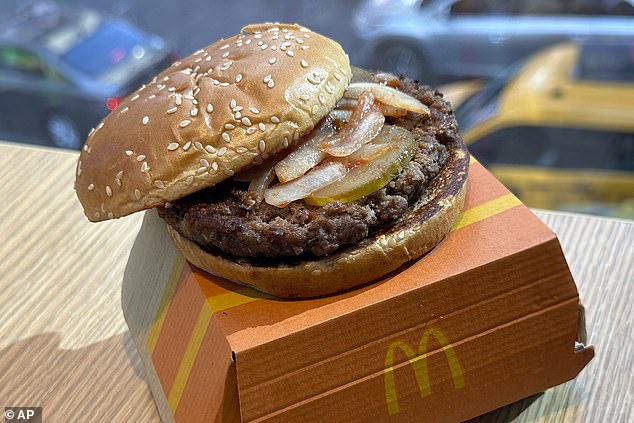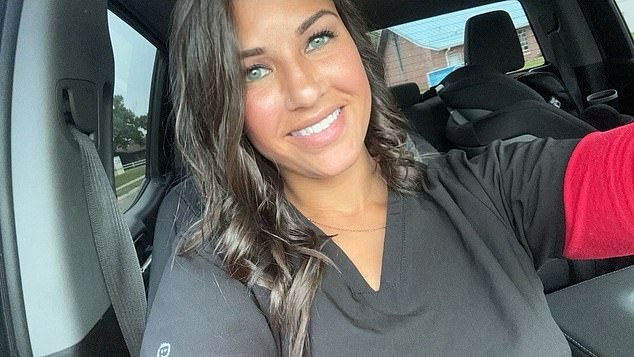I fell severely ill with E Coli after eating McDonald’s Quarter Pounder – here’s what it felt like and why I’m suing
Clarissa DeBrock is suing McDonald’s after eating one of the fast food giant’s famous burgers and being hospitalized with E.coli.
Ms. DeBrock, 33, consumed a Quarter Pounder with her fiancé and two-year-old son Kai at her local McDonald’s in North Platte, Nebraska, last month.
The burger looked and tasted normal, but five days later she started experiencing stomach cramps, diarrhea and nausea. Her symptoms became so severe that she went to the emergency department on September 25.
Tests showed she was infected with E.coli strain O157:H7, the same strain linked to the recent outbreak at the world’s largest fast food chain.
In an update today, the CDC reported that 75 people had now been sickened by E.coli linked to the outbreak in 13 states. Of those, 22 had been hospitalized, one had died and two were suffering from a condition that could cause kidney failure.
Investigators believe the E.coli outbreak stems from the onions used in McDonald’s Quarter Pounders and the company has removed both items from restaurants while officials investigate.
Clarissa DeBrock, a 33-year-old mother of one from Nebraska, is suing McDonald’s because she believes their Quarter Pounders caused her illness

The onions from the burgers (pictured) have been at the center of an investigation into an E.coli outbreak that has so far affected 49 people, hospitalized ten and killed one
Ms. DeBock, a receptionist at a local surgical center, shared NBC News: ‘I could just tell through the cramps that something was wrong, just because they were so bad.
“Flu and stuff gives you cramps, but it was different.”
She added, “It’s just scary, I think, just because you trust them as a fast food restaurant. You trust them to deliver safe food.’
Ms DeBock, who has now largely recovered, said she was grateful her two-year-old was not infected. Kair and her fiancé ate separate meals.
She is now suing McDonald’s for compensation for lost wages, medical bills and physical and emotional suffering.
Although the CDC is aware of 49 cases of E.coli, food safety experts have warned that the outbreak is likely more widespread due to a lag in symptoms. Some cases can also be treated at home and clear up within a few days, meaning they go undiagnosed and unreported. However, health officials are concerned because the bacteria behind it can cause long-term damage to the body.
Trevor Craig, a food safety expert at Microbac Laboratories in Pennsylvania, told DailyMail.com: ‘O157 is much faster than listeria, it can make people sick within a few days.
“But it also has the potential to cause lifelong changes in the body, which is more serious than what we typically see with listeria.”
He said it could cause permanent damage to the kidneys, requiring patients to undergo dialysis (or blood purification) three times a week for the rest of their lives.
In the US, about 265,000 people are affected by E.coli every year and more than 100 people die from the disease – according to health chiefs.
Infections are usually caused by eating contaminated foods such as ground beef – where a contaminated portion of an animal’s intestine has entered the stock – vegetables, which may have been grown with contaminated water, and unpasteurized milk.

The receptionist is suing for compensation for lost wages, medical bills, and physical and emotional suffering
Older adults, young children and people with underlying conditions are especially at risk from the bacteria because they have weakened immune systems.
Patients typically begin to experience symptoms three to four days after infection, although they can also begin more than a week later.
These include diarrhea, stomach cramps and nausea, which may go away within a few days.
However, if people experience persistent, severe or bloody diarrhea, it is recommended that they seek urgent hospital care.
Ms. DeBock is suing McDonald’s for compensation for lost wages, medical bills and physical and emotional suffering. She doesn’t think the restaurant chain with 13,500 locations should have put her in danger.
Her lawsuit was filed by Ron Simon and Associates and is the law firm’s second — after one was filed earlier this week for a man in Colorado who also believes he contracted E.coli from a McDonald’s burger.
The CDC announced the outbreak on Tuesday, with the most cases reported in Colorado, Utah, Nebraska and Wyoming.
An investigation has focused on the chopped onions used in Quarter Pounders, although it is not clear how they may have become contaminated.
Experts suggest the onions may have been treated with water contaminated with animal feces, causing them to carry the infection. E.coli outbreaks often result from contact with feces from the intestines of animals.
The cut onions were recalled Thursday by supplier Taylor Farms, headquartered in California.
Yesterday, Taco Bell, Pizza Hut and KFC also announced that they were removing onions from their menus as a ‘proactive’ measure. There is currently no evidence linking their restaurants to any illnesses. Burger King also joined the move.
McDonald’s U.S. president told consumers on Wednesday to continue ordering food from his restaurants and said the chain had taken “swift action.”
Joe Erlinger said in an interview, “We are confident that you can go to McDonald’s and enjoy our classics.
“This was quick and decisive action by us, and it is the Quarter Pounder and two ingredients of that Quarter Pounder that are under investigation by the CDC.
“So I want to say to our customers, you can go to McDonald’s today with confidence.”
